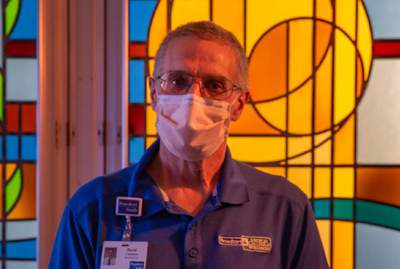David Baugher, coordinating chaplain for Froedtert South, has always taken matters of faith to heart.
It’s been even more important since the beginning of the pandemic that hospitalized hundreds and has led to the deaths of over 300 in Kenosha County.
The Racine resident has worked with Froedtert South hospitals for the past 10 years. He is also affiliated with Great Lakes Church and First Christian Church in Kenosha.
Like others involved in health care, as a chaplain Baugher offers visits with patients and families throughout their healthcare needs spectrum, prioritizing patients by need.
“My role is multi-faceted,” he said in a recent interview at Froedtert Pleasant Prairie.
Linda Wohlgemuth, Froedtert South senior vice president and chief operating officer, noted that in addition to Baugher and another full-time chaplain, community spiritual leaders also help cover the needs of patients from various religions.
“Even through COVID-19, these leaders have willingly come in to see patients, with our staff assuring those visits occurred as safely as possible,” she said.
Work shifted
In regular times, “dozens” of volunteer chaplains and eucharistic ministers would be on hand to assist Baugher and his staff in the Spiritual Care Department.
During the pandemic this cadre of volunteers has been largely put on hiatus. “As soon as possible we want to ramp this up again,” Baugher said.
While the coronavirus precipitated a higher volume of patients with sometimes baffling symptomology and increased potential mortality, Baugher said that his role — as that with others on the front lines of healthcare — did not alter significantly.
“Because we are in crisis work, we are always dealing with coping, loss and grief,” he said. Some factors, however, made this period of care stand out, he said.
“In the early stages we had to do just phone visits rather than in- person, Baugher said.
Additionally, with so many unknowns surrounding the virus he observed an increase in anxiety and fear from patients. “There was a noticeable uptick in people seeking out Bibles and asking (faith) questions.” Ministry to hospital colleagues also increased as he was asked to share prayers with staff. “Support staff making the rounds sometimes pulled (chaplains) aside,” he said. For patients and staff alike, Baugher says he found himself providing education and understanding on grief, compassion, fatigue and resiliency. “These are topics we all needed to reflect on because we were depleting our tanks and they needed filling back up.”
Help families find comfort
“A large part of this education is sitting with a patient in grief, loss and isolation,” he said.
Although face-to-face interaction with families was limited, he offered comfort and prayer whenever possible. “Many requested reading of Scripture, especially Psalm 23 (‘The Lord is my shepherd, I shall not want’).”
However, despite strict no-visitor policies, Baugher notes that priests were always allowed to offer last rites to patients. Baugher was also on hand to offer family comfort during end-of-life situations. “It is very sacred to be able to express words of affirmation and faith at those times,” he said.
“I’m so glad this hospital system puts a high priority on the spirituality of the patients — we serve mind, body and spirit,” he said.
The chaplain’s office also works with the funeral home to help families make the transition if needed. “We try to take the sting out of death and continue to bring hope to people’s lives.”
Despite the additional stresses brought on by the pandemic, Baugher says his work is ultimately very rewarding.
“Serving in a hospital is a blessing,” he said. “God has gifted me and my reward is to be able to comfort and walk with people who are suffering.”
